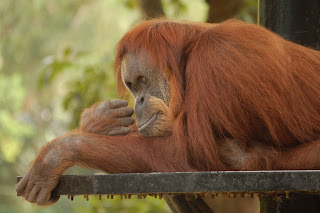I ran the first 'prototype' workshop for journalists at Singapore's Nanyang Technological University's Journalism school. Point of workshop - to encourage more journalists to explore the dynamic tourism industry with its diverse story angles. If we look at tourism from the 'sustainable' viewpoint, we can unearth countless stories on empowerment of women, social issues, education outreach, renewable energy, poverty eradication and of course, environment stewardship, etc...
The workshop touched on - travel trends, statistics and surveys, reality of today's tourism industry and the emerging 'new' traveler. 61% of British travelers say they plan to find out more about the social & environmental impact of their holidays, BUT 76% felt they didn't have enough info to help them make informed choices, in a January 2009 survey by The Good Business 'Concerned Consumers Index.'
Not surprisingly, online travel sites like Responsibletravel.com (UK-based company that sells "ethical" holidays) sees an increase of 25% of sales yearly...
We discussed why travel writing has always been shoved into the lifestyle genre and treated as fluff. It's always about the 'good news' but not the "10 Worst Places to Not Go...and WHY?"
Ethical issues are also at stake - in Asia, especially, most newsrooms still accept sponsored trips by tourism boards, hotels and airline companies - hence, can journalists remain objective and provide balanced reporting? Also, freelance writers usually depends on these freebies to cover their costs...Yet, the good news is sustainable tourism/green travel
are getting more mileage from mainstream international magazines like
Conde Nast Travel, Travel + Leisure & Vanity Fair and
National Geographic Traveler.
Newspapers like New York Times also gets some flak from readers about their travel brochure-like articles. But "NYT travel editor, Stuart Emmrich says he's looking for new angles to describe the most popular destinations and a way to answer comments from readers who said they wanted to see
Alaska before it melts, Laos before it becomes modern like Vietnam and countless places threatened by pollution, the warming climate, or tourists like themselves."
(Elizabeth Becker, Lost in the Travel Pages, Harvard University)We then talked about the horrendous impacts from irresponsible tourism, including examples in Singapore, followed by optimistic outlooks from case studies of best practices in the region. The highlights - efficient use of energy, incentives for wildlife conservation, sustainable design approach, responsible waste management, benefits for local economy and preservation of cultural heritage. Case studies - Thailand (Evason), Cambodia (Tmatboey), India (Spice Village), Indonesia (Alila Resorts; Nikoi Island), Sri Lanka (Heritance Kandalama), Malaysia (Nanga Sumpa).
We took a quick look at some certification schemes (Green Globe 21, Thailand's Green Leaf and Blue Flag); criteria (Wild Asia; Global Sustainable Tourism Criteria), and international awards (Tourism for Tomorrow, Geotourism Challenge) etc, and tips on how to differentiate green warriors from greenwashers.
Next was the crucial part about how we weave ST elements into travel stories, and examples of story angles (beyond travel) that we can glean out of sustainable operators, destinations and community initiatives.The workshop participants were a good mix of experienced journalists from Singapore, India, HongKong, China, The Philippines and Vietnam, a bunch of eager 4th year journalism students, journalism professors and a respected veteran journalist from Singapore...
Some questions raised/discussed:
i. 'What comes to mind when you hear the word, sustainable tourism'?
"it sounds First World..." says a journalist from India. Not surprising...it's one of the many terms (ecotourism, geotourism, etc) that are being bandied about by folks in the Western Hemisphere especially...and being applied to countries in the developing world and Third World. So, what about the locals in these target destinations, do they have a good grasp of the concept or are they just implementing what's being told by their "First World" stakeholders.
But through my travels to India and Sri Lanka, I've found many enlightened locals who founded and run these tourism operations. They're genuine about helping the local communities, and protecting their natural and cultural heritage. Folks like
CGH Earth of Kerala,
Our Native Village in Bangalore,
Aitken Spence and
Jetwing Hotels in Sri Lanka, and the
Ecosphere Spiti in Himachal Pradesh, are some fine examples. There're some bright sparks in Southeast Asia too like Borneo Adventure
(see link above) ii. Can sustainable tourism be incorporated into mass tourism? Or to be ST, it always has to remain in small, niche tourism operations only accessible to the privileged few? (Bhutan, as an example)
iii. And how do journalists accept freebies and be objective at the same time? Is there an alternative option. (The tourism industry doles out one of the biggest advertising revenues to newspapers. In today's reality, most newspapers' survival are dependent on ad revenues)
Through my experience writing for a mainstream newspaper and magazines, genuine and committed operators do not mind a story balanced with positive and negative points (phrased in suggested or future plans for improvements..). After all, doesn't anyone want to be better or inspire others to do so, perhaps?
iv. When does a cultural performance becomes an exploitation of the local culture? Where do you draw the line? What if the local communities themselves are commodifying their cultures since they rely on tourism as quick cash cows?
v. What are the avenues for publishing sustainable tourism stories? (are they limited to environmental pages/sites; NGO websites, personal blogs, or the one-off green issue per year that's popular with mainstream lifestyle magazines lately...)
Overall, the workshop concluded with thought-provoking questions, an earnest discourse and good story ideas generated by the participants during the work group session. Since it's just a prototype, there're lots of room for improvement in the workshop content and effectiveness. Also, how can I take this further? Where can I find a platform to run this workshop for more journalists? Will keep everyone posted...



